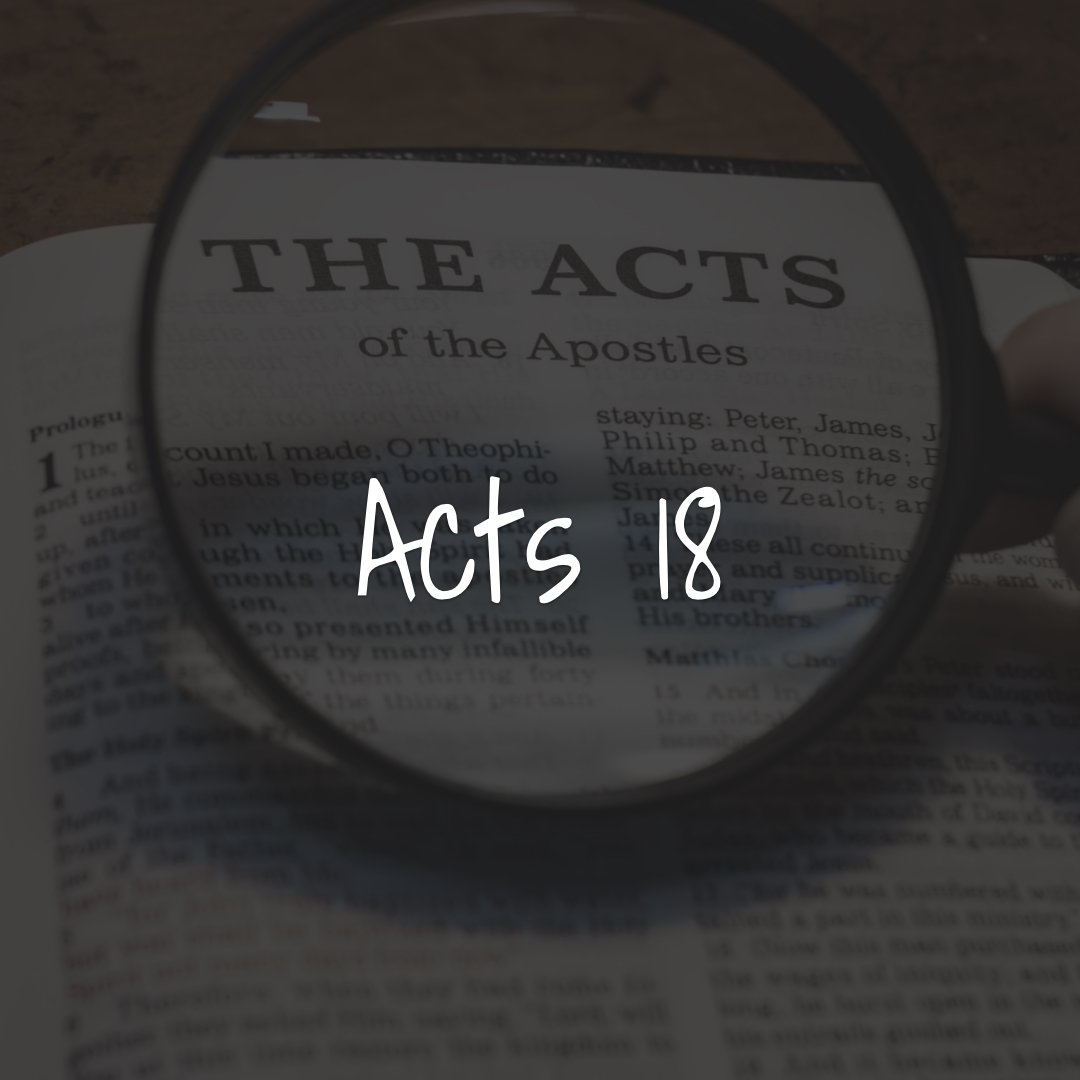
Acts 18
In Acts 18, Paul arrives in Corinth, where he meets Aquila and Priscilla, Jewish tentmakers recently exiled from Rome. He stays with them and preaches in the synagogue, but after opposition from the Jews, he turns to the Gentiles. God encourages Paul in a vision to continue his work, assuring him of protection. He remains in Corinth for a year and a half, teaching the word of God. Later, the Jews bring him before Gallio, the Roman proconsul, but Gallio dismisses the case, seeing it as a religious dispute. Paul then sails to Ephesus with Priscilla and Aquila before heading to Jerusalem and Antioch. Meanwhile, Apollos, a learned man in Ephesus, is instructed more accurately in the way of God by Priscilla and Aquila before continuing his ministry in Achaia.

The Acts of Thomas
The book of Acts centers on Paul’s missionary work, giving the impression he was the only apostle spreading the gospel abroad. However, this is a limited view. Luke’s purpose in Acts was not to record all apostolic missions but to defend Paul’s ministry to the Gentiles. Other apostles were active across the ancient world, preaching the message of the kingdom.
Disciples carried the gospel to Syria, Rome, Alexandria, and beyond. Thomas sent Thaddeus and Mar Mari to Edessa and Mesopotamia. According to early church tradition, the apostles cast lots to divide the nations among themselves, each taking a region to proclaim the good news. Thomas is said to have drawn India (אִינְדְיָא), and though initially reluctant, he eventually journeyed there via a merchant named Habban (חַבָּן).
While Paul’s journeys are documented in Acts, the labors of other apostles survive only through tradition, apocrypha, and scattered historical references. Still, their work fulfilled Isaiah’s vision: “The Torah will go forth from Zion, and the word of the LORD from Jerusalem” (Isaiah 2:3). Apostolic missions were vast, coordinated, and rooted in Jerusalem, the heart of early faith and leadership.

Acts 19
In Acts 19, Paul arrives in Ephesus and encounters disciples who had not yet received the Holy Spirit, leading him to baptize them in the name of Jesus. Through Paul, God performs extraordinary miracles, and many turn from sorcery to faith in Christ. A dramatic clash follows when a silversmith named Demetrius, fearing loss of income from idol-making, incites a riot against Paul, revealing the deep economic and spiritual tensions stirred by the gospel's advance in the city.
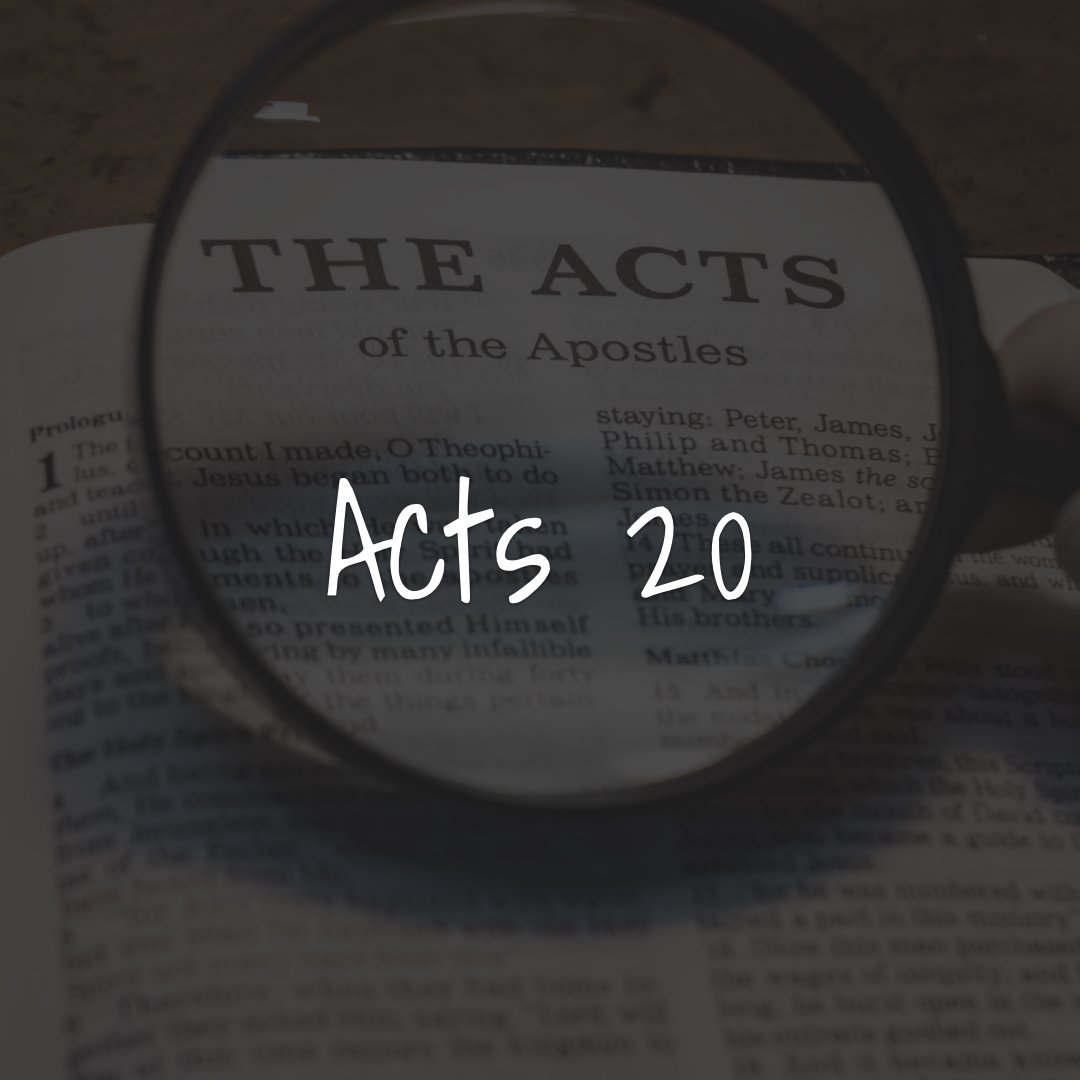
Acts 20
In Acts 20, Paul continues his journey through Macedonia and Greece, encouraging believers along the way. In Troas, he raises a young man named Eutychus from the dead after a long night of teaching. As he travels to Jerusalem, Paul meets with the Ephesian elders in Miletus, giving a heartfelt farewell in which he reflects on his ministry, warns them of coming challenges, and entrusts them to God's care, knowing he will likely never see them again.
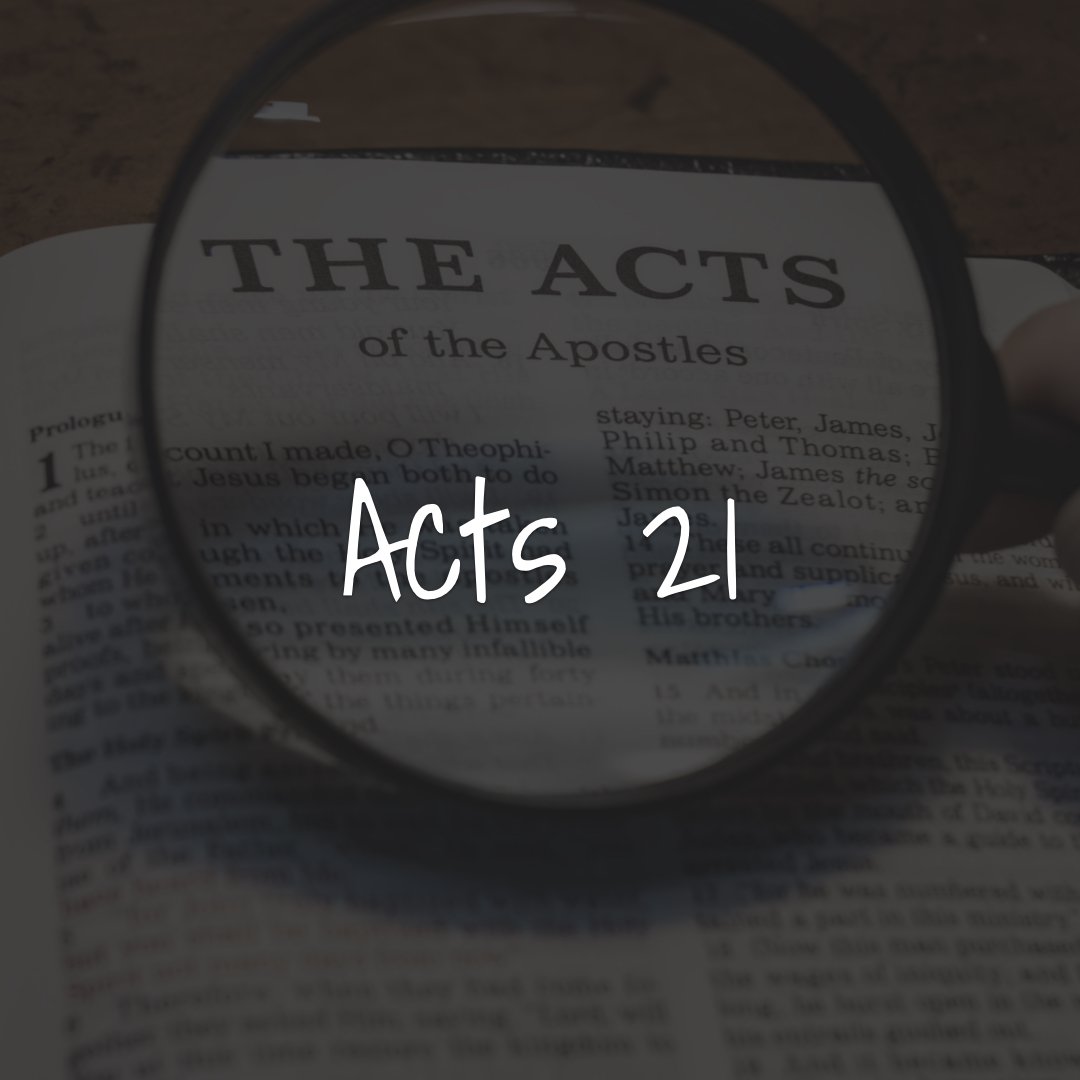
Acts 21
Paul journeys to Jerusalem despite repeated warnings from fellow believers about impending danger. Along the way, he is received warmly by Christian communities. Upon arriving in Jerusalem, he meets with James and the elders and reports how Gentiles have come to faith. To ease concerns among Jewish believers, Paul agrees to participate in a purification ritual. However, while at the temple, he is falsely accused of bringing Gentiles into the holy place, sparking a riot. The Roman authorities intervene, arresting Paul, who then reveals his Roman citizenship as the situation escalates.

Acts 22
Paul addresses the angry crowd in Jerusalem, recounting his Jewish upbringing, persecution of Christians, and dramatic conversion on the road to Damascus. He describes how Jesus appeared to him and called him to preach to the Gentiles. The crowd erupts again at the mention of Gentiles, prompting the Roman commander to bring Paul into the barracks. Paul reveals his Roman citizenship, preventing a flogging and surprising the authorities.
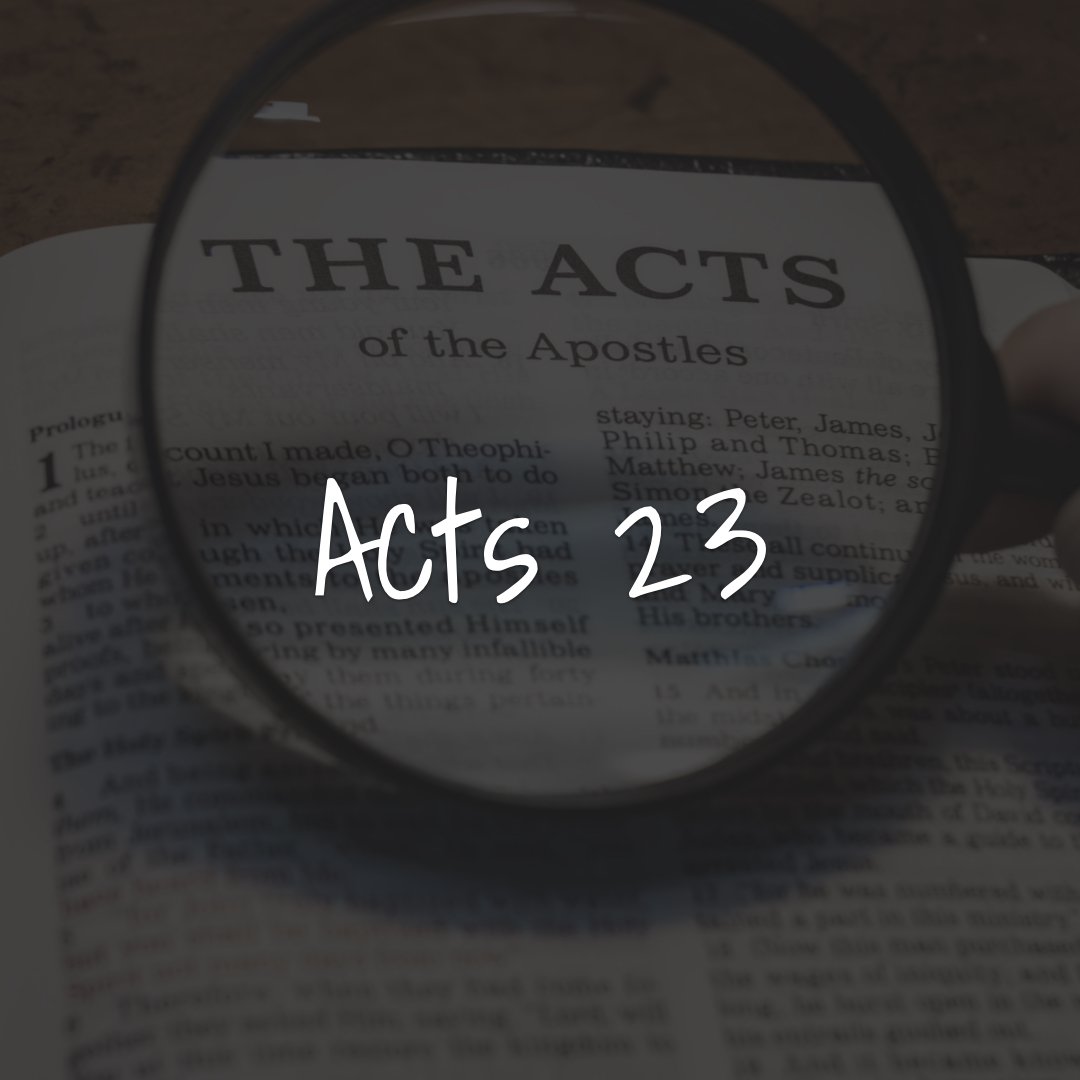
Acts 23
Paul stands before the Sanhedrin and causes division between the Pharisees and Sadducees by proclaiming his hope in the resurrection. A violent dispute ensues, and the Roman commander removes him for safety. That night, the Lord assures Paul he will testify in Rome. A plot to assassinate Paul is uncovered, and he is transferred under heavy guard to the governor Felix in Caesarea.
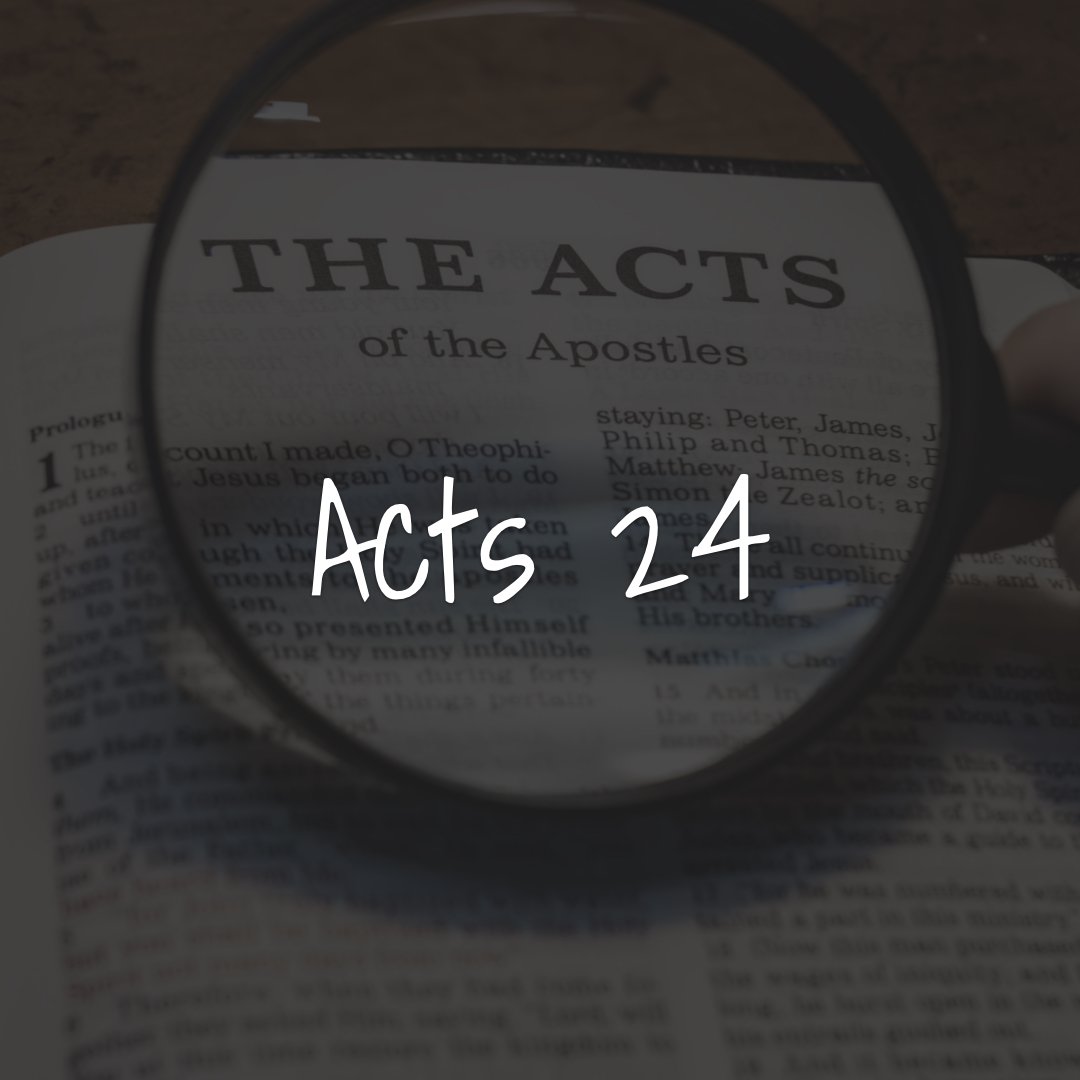
Acts 24
In Caesarea, Paul is accused by the high priest's delegation before Governor Felix. Paul defends himself, insisting he has not stirred up trouble and worships according to the Law and Prophets. Felix delays judgment, hoping for a bribe, and keeps Paul in custody for two years while occasionally conversing with him. When Felix is replaced by Festus, Paul remains imprisoned.
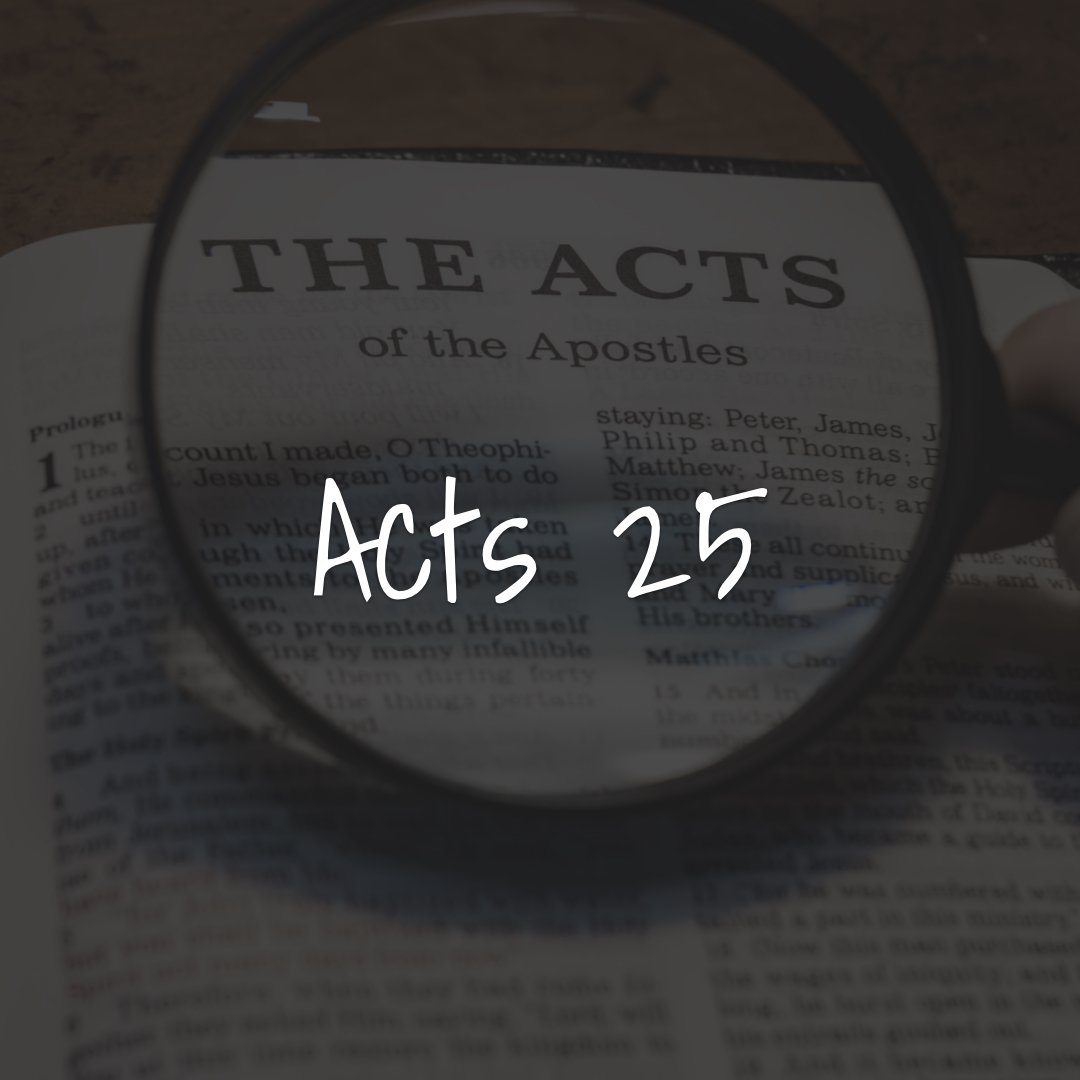
Acts 25
Governor Festus hears Paul's case and, wishing to appease the Jews, considers sending him to Jerusalem. Paul, recognizing the danger, appeals to Caesar. King Agrippa and Bernice visit Festus, and Festus discusses Paul’s case, struggling to articulate formal charges for his appeal. Paul is brought before them to state his defense.
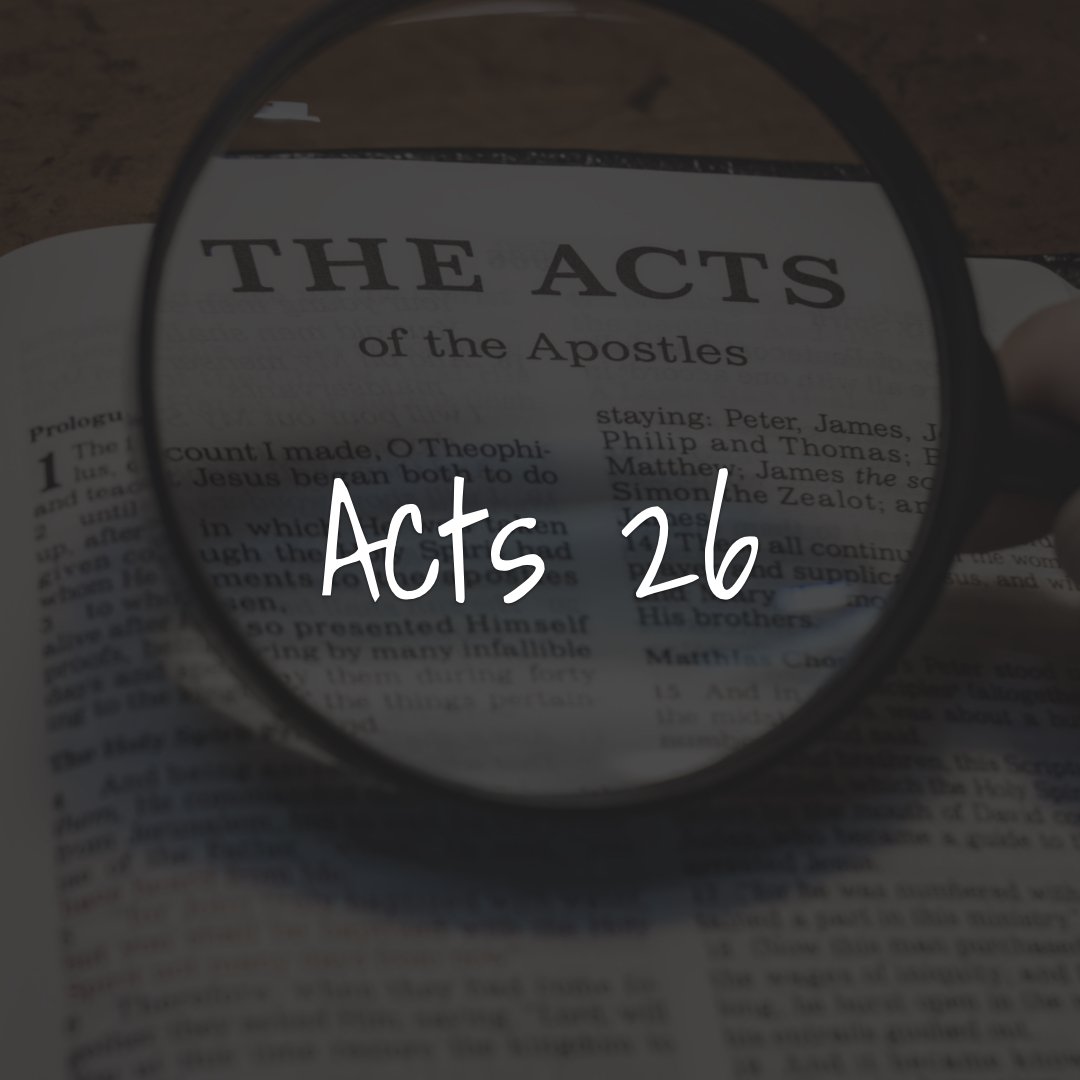
Acts 26
Paul testifies before Agrippa, recounting his early life, persecution of Christians, and belief in Jesus. He explains that his message aligns with the Jewish hope of resurrection and that he has obeyed the divine call to preach to Jews and Gentiles. Festus calls him insane, but Paul insists on the truth of his message. Agrippa is nearly persuaded but concludes Paul could have been released if he had not appealed to Caesar.
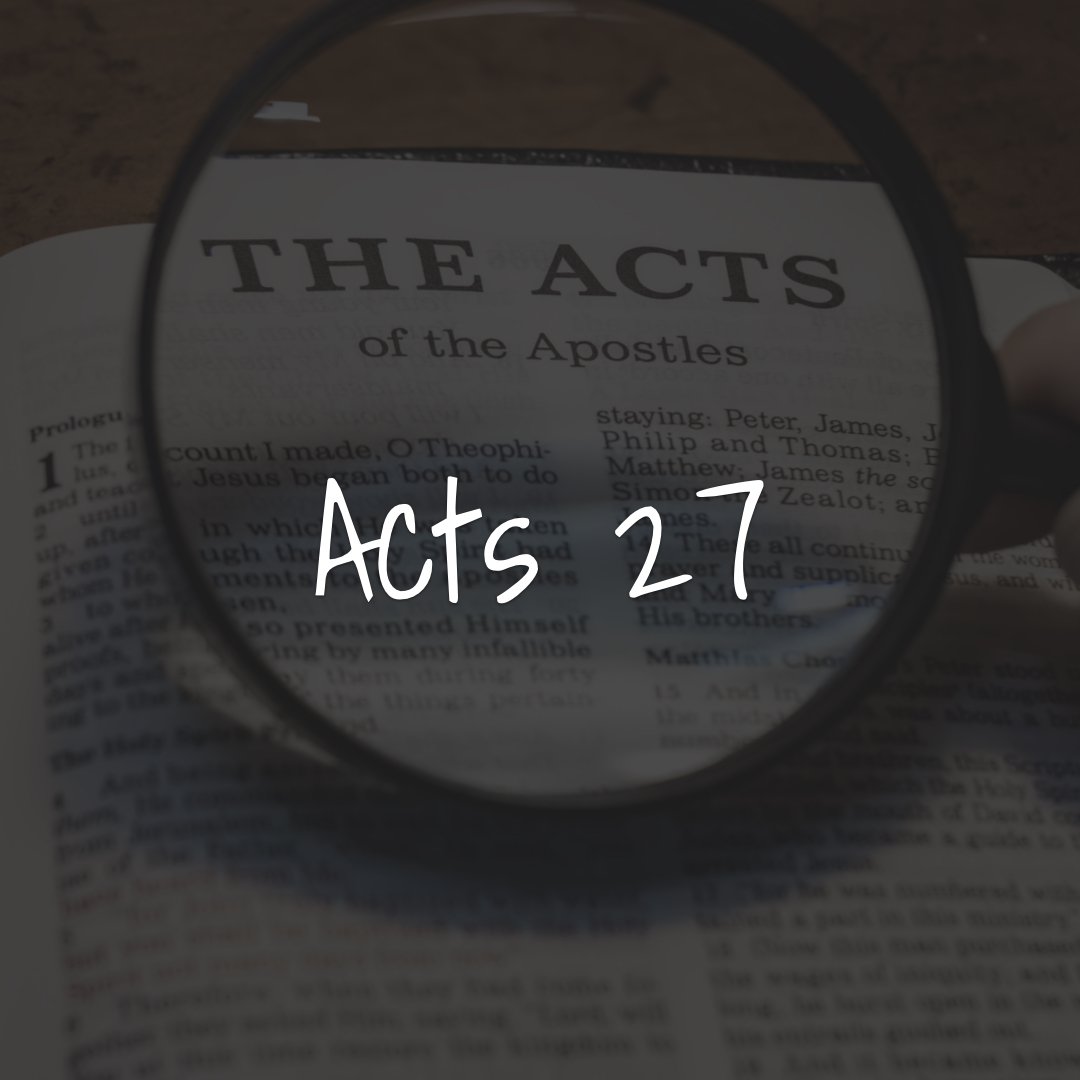
Acts 27
Paul sets sail for Rome under guard. Despite his warning of danger, the voyage proceeds. A violent storm batters the ship for days, and hope seems lost. Paul reassures everyone that an angel told him they would survive, though the ship would be lost. After two weeks adrift, the ship runs aground on Malta. All 276 aboard survive, just as Paul had said.
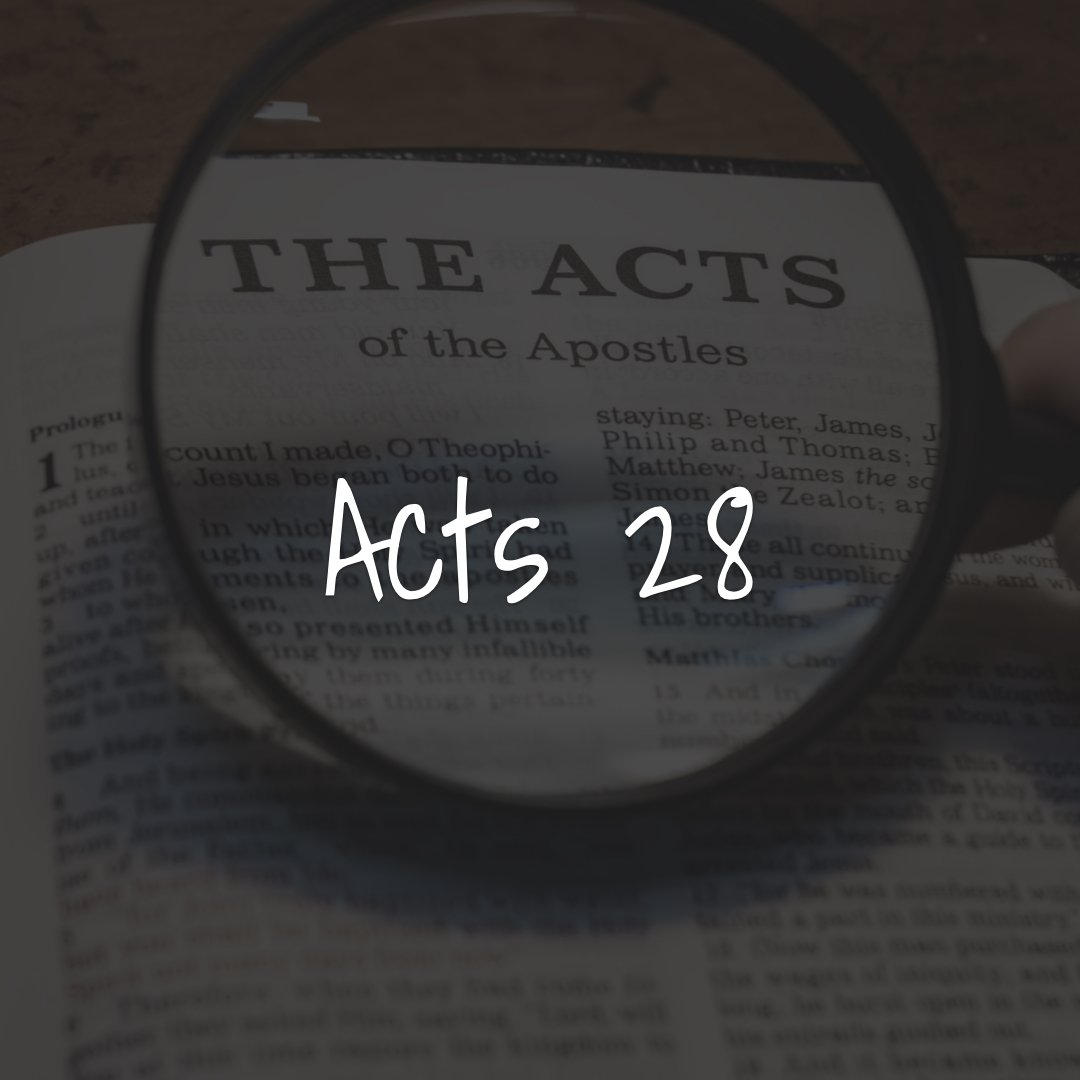
Acts 28
Acts 28 recounts Paul’s arrival in Rome after surviving shipwreck and hardship, where he is placed under house arrest but allowed to receive visitors. He first calls the local Jewish leaders, affirming his loyalty to Jewish customs and explaining that his imprisonment is due to "the hope of Israel." Some are persuaded by his message about Jesus; others are not, leading to division. Paul quotes Isaiah to explain their unbelief and turns to the Gentiles, declaring that salvation has been sent to them. The chapter ends with Paul preaching boldly about the kingdom of God and teaching about Jesus for two years, unhindered.

James, The History of John, Acts of John by Prochorus & Acts of Andrew
According to early Christian tradition, the apostles cast lots to divide the nations for evangelism. Simon Peter received Pontus and Bithynia, while his brother Andrew received Scythia, regions surrounding the Black Sea. Peter is believed to have ministered among Jewish communities in Asia Minor, possibly influencing early converts like Aquila of Pontus. Andrew ventured into Scythia, a harsh and uncivilized region by Roman standards, with Russian traditions claiming he reached as far as Kiev and Armenia. Later, amid growing controversy surrounding Paul’s teachings, Peter and John were tasked with reinforcing apostolic authority and clarifying the relationship between Torah and faith among the Diaspora. This may have prompted Andrew to journey west into Macedonia and Achaia, following Paul’s earlier mission fields. The effort to preserve doctrinal clarity and care for emerging communities reflected the collaborative leadership of James, Peter, and John, whom early believers regarded as the pillars of the faith.

The Lycus Valley & Acts of Philip
In the Lycus Valley, Hierapolis bubbled with geothermal springs, Colossae offered cold-water sources, and Laodicea relied on aqueducts carrying tepid, mineral-laden water—conditions that gave rise to the vivid “lukewarm” imagery in Revelation 3.15–16. This same valley became the mission field of the apostle Philip, whose arrival in Hierapolis with Mariamne and Bartholomew confronted a city steeped in snake worship and oracle cults. Acts of Philip recounts dramatic confrontations, miracles, and martyrdom amid a backdrop of spiritual deception and Roman idolatry. The region’s textile and eye-salve industries—along with its water sources—are echoed in the Messiah’s rebuke to Laodicea, symbolically calling them to spiritual healing, true wealth, and restored vision.

The Testimony of James
James the brother of Yeshua, known as HaTzaddik (הצדיק), meaning "The Righteous," served as the overseer (episkopos, ἐπίσκοπος) of the assembly in Jerusalem and steward of the Master’s household. Revered for his ascetic lifestyle and scrupulous piety, James held a position of immense respect among all Jewish sects and led the early community of believers with authority and wisdom. According to tradition, his prayers formed a spiritual bulwark around Jerusalem until his martyrdom in 62 CE, when a Sadducean-led Sanhedrin condemned him for testifying that Yeshua was the Messiah. His death marked a turning point, with early believers linking the fall of Jerusalem to the loss of their righteous intercessor.

Bartholomew
The Apostle Bartholomew travels by caravan across the Egyptian deserts. He teaches the words of Yeshua in India, Armenia, and Lycaonia. King Polemo of nearby Cilicia Tracheia, a recent convert to Judaism, marries Queen Bernice, but idolatry still persists in his kingdom. Bartholomew's arrival in the kingdom cofounds the local cult. Polemo invites Bartholomew to heal his demonized daughter. The apostle exorcises the demon. For the benefit of Polemo and Bernice, Bartholomew challenges the local cult and publicly defeats them. Persuaded, King Polemo orders the idol destroved. The king's uncle, a high priest of Zeus, has Bartholomew arrested and put to death.

Peter in Rome
Following the martyrdom of James, the early disciples and relatives of Yeshua appointed Simeon son of Clopas—his cousin and a member of the Davidic line—as the new leader in Jerusalem. His leadership preserved the unity and purity of the early assembly until challenges arose from Thebuthis, a disgruntled relative who later sowed division. Amid rising tension and prophetic warnings, such as the haunting cries of Yeshua ben Chananiyah, Rome became a spiritual battleground. There, Simon Peter confronted the heretic Simon Magus, whose sorcery and Gnostic teachings threatened the gospel. Their clash culminated in a dramatic showdown where, according to legend, Magus attempted to fly but fell at Peter’s prayerful rebuke, signaling both his defeat and a turning point in Rome’s view of the Yeshua movement. These events heightened persecution but also solidified Peter’s influence, prompting the recording of his teachings through Mark’s Gospel and his letter, 1 Peter, encouraging believers to stand firm amid trials and maintain holiness and loyalty in the face of rising hostility.

The Inferno
Beneath the shadow of the seven hills, amid Rome’s opulence and vice, the beast emerged—not from myth, but history. Nero, adorned with the crowns of empire and clothed in madness, devoured restraint and truth alike, becoming the embodiment of chaos and blasphemy. With Tigellinus whispering perversions in his ear and ambition fanned by unchecked power, he razed the old city in flames and baptized the new in blood. The saints, bound to stakes and lit as torches in his gardens, bore silent witness to Revelation's dread prophecy: the beast that rose from the sea had found his throne, and the world applauded.
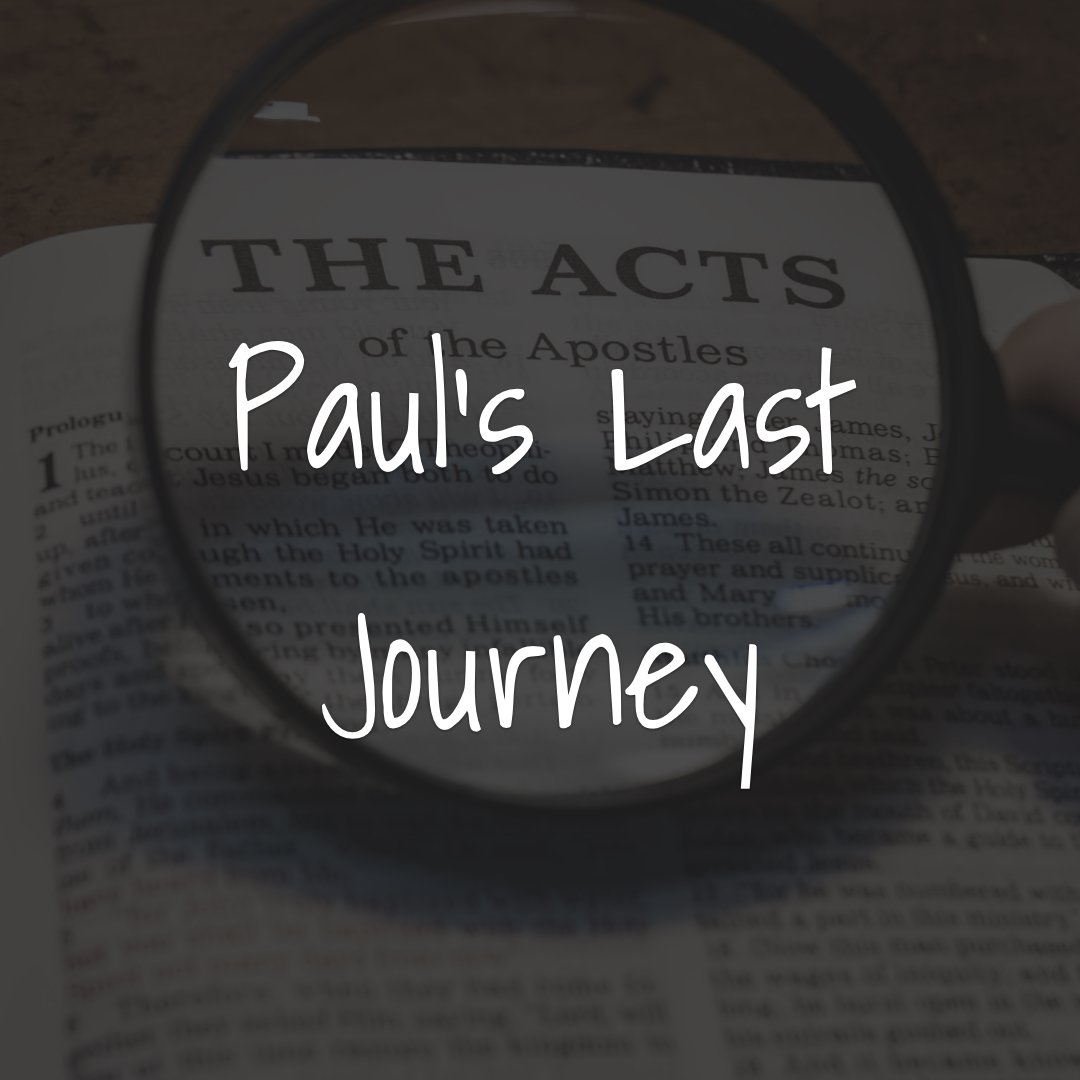
Paul’s Last Journey
Following his release from Roman custody around 62 CE, Paul resumed his apostolic mission with renewed purpose. Traditions and letters suggest he traveled west to Spain, fulfilling his long-held desire to preach where Messiah had not yet been proclaimed. After his likely return through Crete—where he left Titus to organize the communities—Paul reconnected with Timothy in Troas, addressing concerns in Ephesus and combating early heresies. As tensions rose across the empire, Paul continued his journey through Macedonia, wintered in Nicopolis, and eventually attempted to return to Ephesus via Miletus. There, however, his plans were abruptly disrupted, possibly due to betrayal, forcing him to flee—ultimately leading to his re-arrest and final imprisonment in Rome. There, abandoned by many and awaiting execution, Paul penned his final letter to Timothy, urging him to remain faithful amid hardship and to visit him before winter.

Flight to Pella
After James the Righteous was martyred, Simeon son of Clopas succeeded him as leader of the believers in Jerusalem, who continued meeting in Solomon’s Colonnade. Seeking to remove them from this sacred space, the Sadducean chief priests proposed a construction project to King Agrippa II under the guise of providing work for thousands of idle laborers—work that would dismantle and rebuild Solomon’s Colonnade. Agrippa rejected the plan, remarking that demolition is easier than rebuilding—a sentiment that echoed Yeshua’s words in John 2:19. Thwarted, the priests seemingly used their authority to ban Yeshua’s followers from the Temple. The Epistle to the Hebrews, written to this marginalized community, urges them to hold fast to their confession, assuring them that their hope lies not in the earthly Temple but in the heavenly one where Messiah serves as high priest.